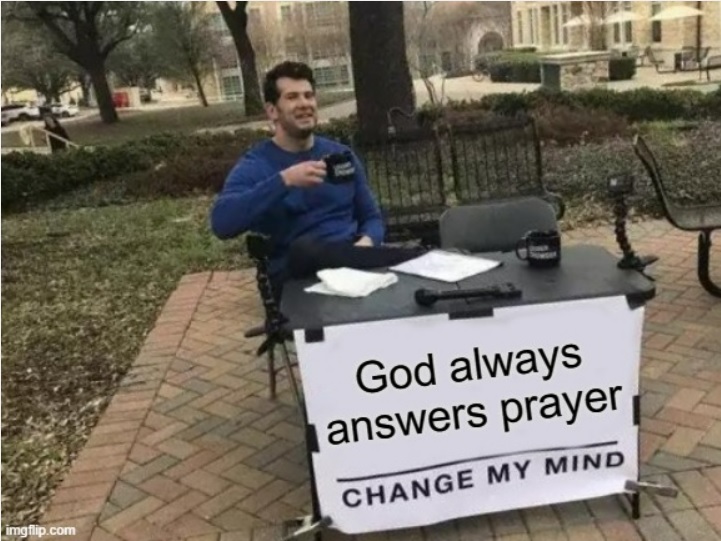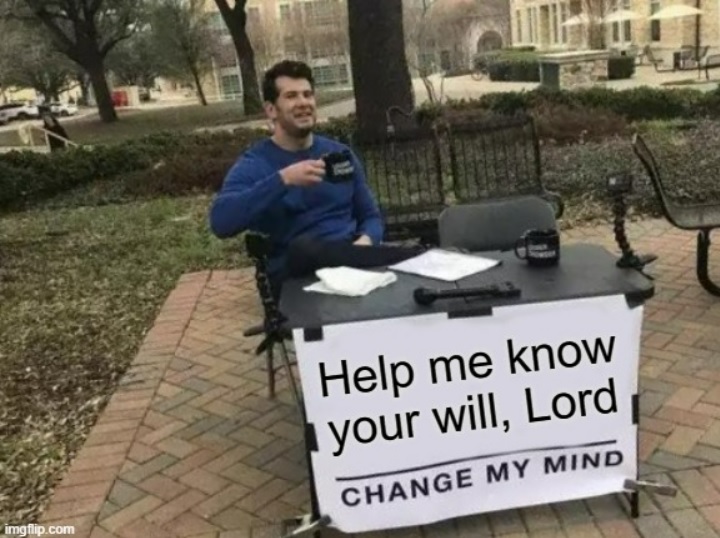One of my favorite memes of late features a guy:
– sitting outdoors in a patio chair,
– behind a table,
– sipping coffee,
– with a large sign taped on the table.
It’s a meme, so the sign can say anything. Often the sign makes a claim you can’t help but ponder. Sometimes the claim is shocking. Other times it’s downright funny. This particular meme, however, always ends in these three words:
Change my mind
Because no matter what the sign says the idea is the same: you are being invited to sit down, sip some coffee, and join the conversation.
All in a relaxed outdoor space, with a friendly looking bloke donning a light blue sweater.

The meme, when paired with a compelling statement and placed in a popular online spot can easily go viral with –
dozens,
hundreds, sometimes
thousands of –
people entering into the digital debate.
Each chiming in on whether the claim might, or might not, be true.
For grins here are a few silly favorites –
– Cereal with milk is soup
– Floors are walls we walk on
– Australians are just British Texans
– Potatoes are just edible rocks
– A group of kangaroos should be called a gangaroo.
– Beds are wireless chargers for humans
– Muffins are cupcakes for breakfast
Change my mind,
Change my mind,
Change my mind.
And then, after significant conversation, and new information being presented, every-so-often an amazing thing happens: the person changes their mind.
Tho if you are no fan of potatoes you’ll likely always believe they really are just edible rocks 😉.
To be honest this notion, that a person can change their mind these days – on anything – renews my hope for humanity just a bit. It’s nice to think two people, with disparate views can still sit down, build relationship, and find common ground.
Lord, we could use more of that in our culture right now.
Prayer
The gospel text today features a different kind of conversation. One of the disciples sees Christ praying and realizes something: they have more to learn.
Lord, teach us to pray, they ask.
We want to do it right.
We want to be more like you.
Jesus responds by sharing familiar language; it’s the Lord’s Prayer. The prayer found in Luke’s text is an abbreviated form. The larger, more well-known version is in Matthew.
Father, hallowed be your name.
Your kingdom come.
Give us each day our daily bread.
And forgive us our sins,
For we ourselves forgive everyone indebted to us,
And do not bring us to the time of trial.
Said differently, the prayer, in seven parts:
Names our creator,
Celebrates who they are,
Asks to be close to them,
Requests a meal,
Requests forgiveness,
Just as we forgive others,
And asks to be kept safe.
It serves as a cliff note of sorts on how to go about a crucial aspect of our faith.
Neighbor
These are more than just words to memorize, more than mere liturgy. Seeking to help the disciples understand the concept on a deeper level Jesus gives an example.
Say that friends of yours drop in, unannounced.
They’ve been travelling all day.
They are starving.
You want to help.
But there’s a problem.
It’s after midnight.
The stores are closed.
Your cupboards are bare.
Because you need to go shopping yourself.
Fortunately, a light bulb goes off.
You have a good neighbor.
They have plenty of food.
It’s always, in fact,
Way more than enough.
Perhaps they would help?
But it’s so very late.
You don’t want to put them out.
Would they get upset?
You worry they might.
But your friends are hungry.
And you just want to help.
You decide to be bold.
It couldn’t hurt to ask.
So you go to your neighbor,
in the middle of the night,
and ask for food.
Explaining why, as best you can.
And what do you know,
Your neighbor gets up,
Heads to the cupboard,
And gives you whatever you need.
Prayer is like this, Jesus concludes. We are to –
Be persistent.
Be tenacious.
Be bold.
Ask, and it will be given.
Seek and you will find.
Knock, and the door will be opened unto you.
For God is your neighbor with an unlimited supply of goodness. A neighbor who is ready to share it all.
Until
It all sounds so –
Simple,
Linear,
Straightforward.
As a formula for how prayer works it certainly is. We are to keep on going to our neighbor Creator, constantly. Bringing them all our –
needs,
hopes,
desires.
Going to our neighbor Creator for –
ourselves,
friends,
family,
community,
country,
world.
Which takes care of everything we think we might need.
Because God always answers prayers. Right?
Every time, exactly how you ask for it. Right?
No?
Not always?
You’ve got the receipts?
This begs more questions. Are we not praying –
the right way?
enough?
Or are prayers being answered differently?
So much so we can’t tell they are being answered at all?
As a pastor I should probably have nice clean, air-tight answers for you on this. Other clergy and theologians do (or at least try to).
Yet simple answers to tough questions, when viewed more closely, often fail us. Both creator and created are infinitely more complicated than that.
So how do we reconcile this notion that –
1) we merely ask and it shall be given, with
2) the reality that this isn’t always the case?
You likely have some stories of unanswered prayer. No worries; I have some too.
What might we be missing here?
Your Kingdom Come
One of the petitions in Luke’s version of the Lord’s Prayer is Your kingdom come. Matthew’s rendition expands on that with Your will be done, on earth as it is in heaven.
It is a reminder that we’re praying for God’s will to be done, not ours. And that we’re praying for the utopia of heaven to be better realized, right here on earth.
To do that it sure would help if we could be better attuned to the mind of God.
Conversation
Like our meme guy sitting down, sipping coffee, we too make bold statements to the world around us. Statements that reflect our –
Hopes,
Beliefs,
Values,
Wants,
Needs, and
So very much more.
We too constantly broadcast our views on –
how the world currently works (or doesn’t), and
how the world should.
Some of which is aligned with the divine.
Some of which is not.
Like our meme guy –
we too wait for someone to join us at the table.
we too desire feedback on all we feel the world should be.
I’d like to suggest something a bit odd.
This meme guy is one way to consider prayer.
So, with coffee in hand,
or tea, soda, water, or beer,
(it’s an inclusive prayer)
be ready to share,
via pen, paper, mental note.
Include your –
hopes and dreams,
hurts and hangups,
requests for you,
others, the world.
Invite the Creator of all that is to sit down with you.
Make your requests.
Be persistent.
Be tenacious.
Be bold.
Perhaps pray for things like –
Winning the lottery,
Clothing those without,
Feeding the hungry,
Getting Aunt Bertha to her 100th birthday,
Treating others with dignity and respect,
Helping your favorite politician prevail,
Loving your neighbor, as yourself.
Then if it be your will, Lord, please make it so.
And thank you very much, in advance, for that.
And if it is not your will Lord, help me understand.
Please stay at the table Lord, let’s keep talking.
Because I need you to do something for me.
So I can better follow your ways.
Change my mind. Amen.




